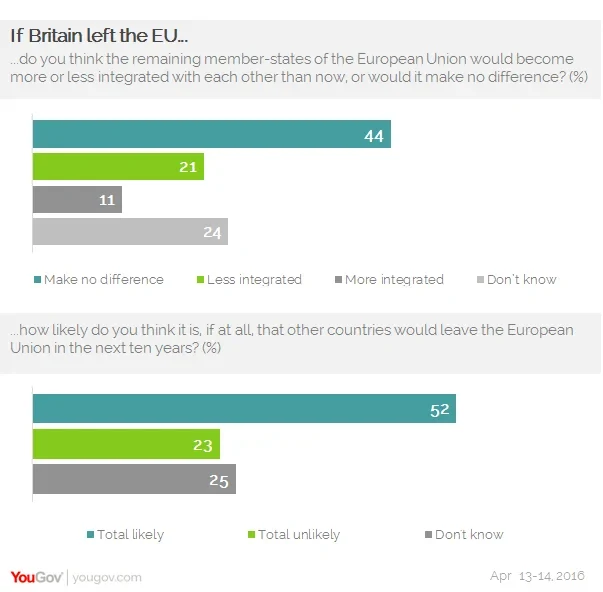The latest YouGov/Cambridge seminars suggest both politicians and the public are missing a key aspect of the Brexit debate, namely its likely impact on the rest of Europe and what sort of continental order is good for Britain.
The novelist F. Scott Fitzgerald believed it was a sign of great intelligence if someone could hold two opposing ideas in mind at once. The pollster might add: it is also a common trait of public opinion, as evident in current views on the geopolitics of ‘Brexit’.
YouGov recently teamed up with a new initiative at Cambridge University, called the Forum on Geopolitics, to survey British public perceptions of what a vote to leave the European Union (EU) might mean for both the United Kingdom and mainland Europe. (See results)
Led by Professor Brendan Simms, the Forum is a first step in the development of a new ‘Centre of Geopolitics and Grand Strategy’, or CoGGS, which will put Cambridge on the map as a hub for geopolitical thought and practice, with a major focus on Britain’s role in Europe and Europe’s role in the world.
The joint research was produced for two scenario panel events held by the Forum, exploring the precise consequences of a British exit from the EU – i.e. Brexit.
Chaired by Simon Heffer, speakers included Kate Hoey MP, Tristram Hunt MP, Bronwen Maddox (Editor, Prospect Magazine), Professor David Runciman (Head of the Cambridge POLIS Department) and others, with YouGov presentations from CEO Stephan Shakespeare and political chief Joe Twyman.
According to the Forum Event Report that followed: “What was striking about the polling material produced, and most of the discussion, was that very few people have taken into account the likely impact of a Brexit on the rest of Europe.”
Commenting on the figures, Professor Simms added: “Most seem to believe two contradictory things at the same time, namely that (a) leaving the EU will not have a negative impact on the rump EU, or affect levels of integration, and that (b) a British departure would greatly increase the likelihood of other exits, and thus the chances of total disintegration”.
The polling duly shows that many voters are doubtful of a significant Brexit effect on the wider EU:
- Only one in five respondents (21%) thought leaving the EU would lead to less integration among its remaining members, while a majority said it would either make no difference (44%) or lead to greater integration (11%).
- Just over half (52%) said it would make no real difference to Europe’s influence in the world, compared with only 27% suggesting Europe would have less influence as a result.
- Respondents were broadly divided on whether Brexit would leave the EU economically worse off (39%) or would make no real difference (33%).
But a majority also predict that if Britain left the EU, other countries would likely follow suit in the next 10 years (52%), while if Britain stayed, this is unlikely to happen (51%).

As Professor Simms concluded, “It may be, therefore, that the debate is missing a key aspect, which is - whether Britain is 'in' or 'out' - the question of what sort of continental European order is good for Britain and what sort of impact the decision in June will have on it”.
In other findings:
Status of EU foreign citizens in Britain
54% of respondents overall said Brexit should lead to stricter controls of some form on foreign EU citizens in Britain, with options including:
- Foreign EU citizens should have to leave and return to their own country (9%).
- Foreign EU citizens who have been here for at least five years should be allowed to stay but others should have to leave (17%).
- Foreign EU citizens already here should be allowed to stay but other EU citizens should no longer be allowed to come and live in Britain (28%).
Only 24% overall think we should continue to allow foreign EU citizens to come and live in Britain as they do now
Scotland/the Union
The proportion of respondents who saw Scotland’s place in the UK as being to the latter’s membership of the EU was small but notably larger among Ins than Outs.
- 45% overall predicted Scotland will either stay in the UK (26%) or leave it (19%) regardless of whether Britain leaves the EU, while only one in five (20%) thought Scotland would probably leave the UK if we voted for Brexit but probably stay if we remain in the EU.
- By comparison, 33% of Ins said Scotland would leave the UK in the case of Brexit but stay in the case of ‘Bremain’, compared with 12% of Outs predicting the same.
Methodology: Fieldwork was conducted online between 13-14 April, 2016, with a total sample of 1688 British adults. The data have been weighted and results are representative of all British adults aged 18 or over.






